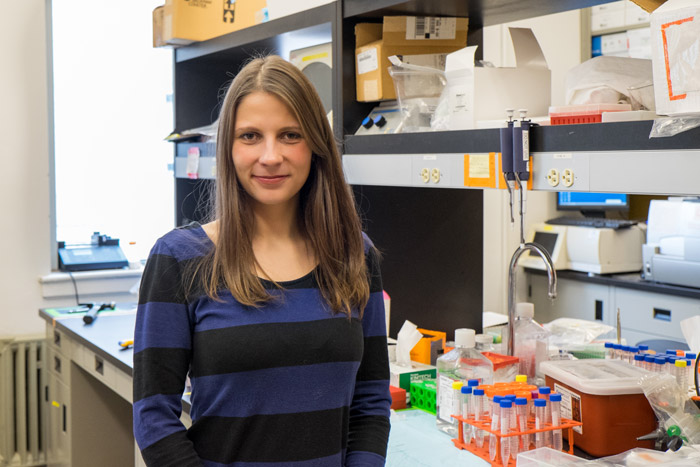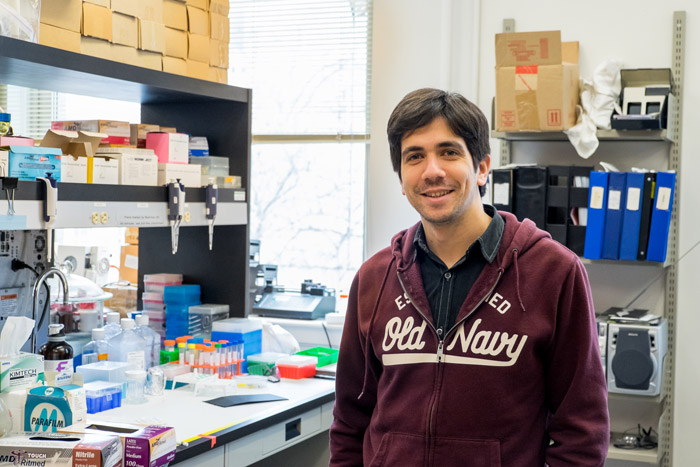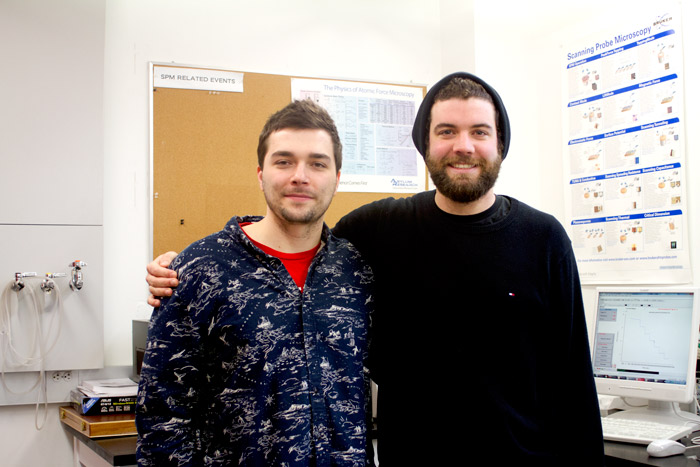“I can’t sleep some nights if I’m thinking about a model,” Rob Harkness said, laughing.
Though easy to misinterpret, Harkness, a chemistry PhD student from the Mittermaier lab—who study biological systems primarily using calorimetry and NMR—is in fact talking about science.
“I’ve woken up some nights to text my supervisor, ‘Is it this?’” he explained.
Evidently, those involved in a PhD program clearly exude a passion for science.
“You’ve gotta love it,” Yasser Gidi, a PhD student from the Cosa lab—whose focus is on chemical imaging—said. “[Otherwise,] you’re wasting your time.”
Although there is no shortage of talents outside of the lab—Gidi spent a single day last summer cycling around the island of Montreal, describing it modestly as “a challenge”—it’s clear that it’s science, more often than not, that gets them out of bed in the morning.
Entering a program with neither a predictable outcome nor a guarantee of success can be daunting for graduates used to a largely textbook-based education. But learning to be okay with being wrong, and having the space to be wrong as many times as it takes offers a freedom that’s rare in academia. A PhD can be a refreshing change from the memorize, regurgitate, repeat mentality of an undergraduate degree.
“Doing a PhD is nice if you’re looking to solve problems,” Harkness said. “You constantly have to figure stuff out on your own. It’s about developing ways to get the information, not just about the information itself.”
A PhD is like a puzzle. It’s as valuable to learn how best to slot pieces together as it is to achieve the final picture. One of the main attractions of a PhD, the students explained, was the independence offered; in particular, the opportunity to come across an avenue you want to pursue, to change direction, and pursue it.
“My initial project is nothing like my current project,” Viktorija Glembockytė, a PhD student from the Cosa lab explained. “It’s a very dynamic process: You change your ideas a lot.”

This freedom is a heady thing. The lack of a nine-to-five structure, required classes, or general university attendance requires impressive self-discipline. Research involves a lot of trial and error—albeit educated trial and minimized error, Justin Di Trani, a PhD student from the Mittermaier lab explained—and it’s essential to be prepared for long nights and weeks of frustration. The love of science can only get you so far, however, without a combination of effort and sheer luck, it’s not always enough.
“People do quit because stuff’s not working and they can’t see the end,” Harkness explained.
A big part of the PhD life is dictated by the number of hours one is willing to put in. Di Trani’s record for latest night in the lab is 3 a.m. And that doesn’t even guarantee results.
“There [are] days when you just do nothing and the experiments come out beautifully, and you’re like, What did I do right?” Di Trani explained. “You just don’t question it.”
Each student speaks of the same thing: The devastation when nothing will go right, and the elation when, out of the blue, something finally does. But doing a PhD gives you skills useful outside as well as inside the lab. This includes things like patience, determination, and the capacity to see a failure not as the end of the road but as the starting point for 10 more.
“It takes months or years of doing that same experiment over and over to refine it down to the processes you see in textbooks,” Di Trani explained.
And to achieve that level, a student must have an incredible amount of self-control.
“It’s probably the first time in my life that I’ve had to learn what a healthy work-life balance is,” Glembockytė said.
Ninety per cent of the time, Gidi explained, the work can be frustrating. But the remaining 10 per cent?
“It’s worth the struggle,” Gidi said. “The satisfaction is even greater.”

For any skeptics, it’s clear that this isn’t just talk. Glembockytė’s work enables her to watch individual molecules using a microscope and a specialized camera. They look like tiny stars dotting a wide sky. The chance to actively participate in that level of science firsthand is only achievable when a person is studying for a PhD.
The divisions between different branches of science, so firmly established at high school and undergraduate level, gradually lessen as the level increases. The Cosa lab’s work, for example, draws from chemistry, physics and biology, although its students might only have had specific training in one or two of those fields prior to their PhD. Although a PhD isn’t a collaborative process, every finding could prove useful to someone else in the lab; the atmosphere can feel a little like a think tank, especially with a supervisor who encourages discussing projects and juggling ideas. And the competition isn’t as fierce as some would imagine.
“Everyone at this level’s pretty intelligent; so at this point, what makes you different is how much you work,” Harkness said. “I feel most of the [competitive pressure] from myself.”
As for life after PhD, most haven’t really thought about it. Nevertheless, all must ultimately deal with their defence—the culmination of a PhD, where the student’s thesis is interrogated by a panel of professors.
“I’ve never heard of anybody failing a defence,” Di Trani said. “I haven’t really thought about it. I’m just not going to think about it.”
Looking back to their undergraduate days, there’s one, resounding piece of advice for aspiring PhD students: Work in a lab first.
“That was when I realized, this is fun for me,” Harkness said. “I wanted to do something where I could actually figure stuff out.”
All of the students interviewed seemed inspired from their work. They all had a sentiment that could only come from discovery.
“When you discover something, and you know you’re the only person [who] knows that—that’s one of the most exciting parts about research,” Gidi said.
This sentiment was echoed by Harkness.
“You’re figuring out how the universe works, how it behaves,” he explained. “It’s cool.”
A perhaps unexpected perk of being a PhD student is holding expertise in such a narrow field.
“[It’s cool being] able to hold intellectual conversations on a very specific topic that maybe 10 people in the world care about,” Glembockytė said.
Not only that, the impact is mutual; some of the experimental techniques developed by PhD students, if effective, will continue to be used by that lab in the future.
“When I leave I’ll be able to say, My lab does this now because of the research that I did,” Harkness said.
That alone seems like something to be proud of.
Rob Harkness and Justin Di Trani from the Mittermaier lab, study the thermodynamics and kinetics of biological systems using NMR, calorimetry, and physical chemical theory. Viktorija Glembockytė and Yasser Gidi from the Cosa lab study single molecule spectroscopy and visualisation with a view to the study and development of nanomaterials.








